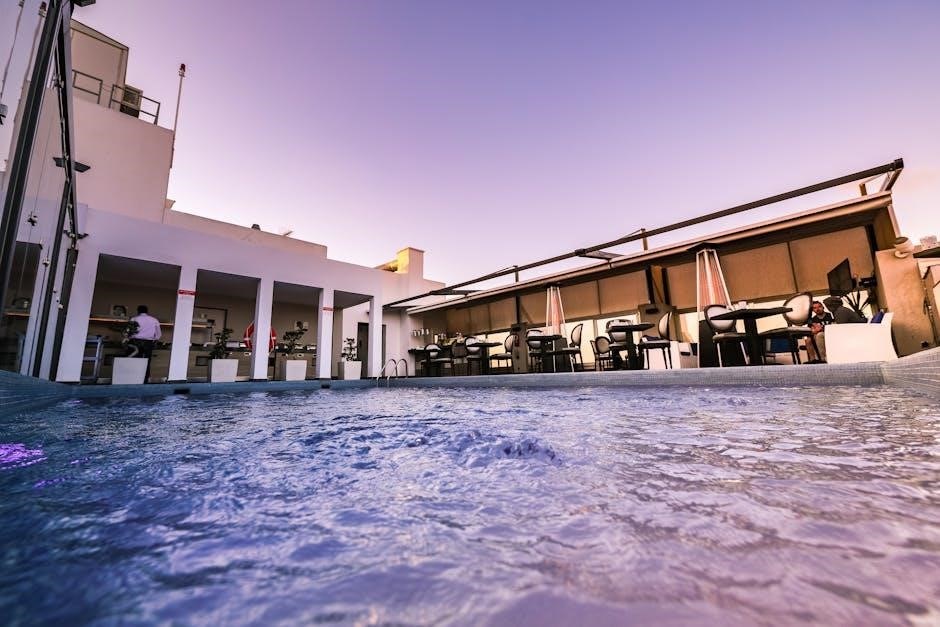Selecting the right pool table size is crucial for optimal gameplay and room aesthetics. Understanding standard dimensions and space requirements ensures a perfect fit for your needs and skill level;
Why Pool Table Size Matters
The size of a pool table significantly impacts gameplay, skill development, and overall enjoyment. A table that is too small may limit playing techniques and hinder progress for serious players. Conversely, a table that is too large can dominate a room, making it impractical for smaller spaces. Proper dimensions ensure fair play, accurate shots, and a balanced experience. Understanding the right size for your space and skill level is essential to maximize fun and challenge. It also affects the dynamics of group play and the overall ambiance of the game area, making size a critical factor in your decision.
Overview of Standard Pool Table Dimensions
Standard pool tables vary in size to accommodate different spaces and playing preferences. Common residential sizes include 7-foot, 8-foot, and 9-foot tables, with 9-foot being the official tournament size. Commercial tables often range from 7-foot to 10-foot, catering to professional settings. Each size offers a unique playing experience, with larger tables demanding greater skill and smaller tables providing faster gameplay. Understanding these dimensions helps in selecting a table that fits both your room and your level of play, ensuring an enjoyable and challenging experience for all users.
Understanding Pool Table Sizes
Pool table sizes vary to suit different spaces and skill levels, ensuring optimal gameplay and room aesthetics. Proper sizing enhances both enjoyment and performance for players of all levels.
Residential Pool Table Sizes
Residential pool tables typically range from 7ft to 9ft in length, with 8ft being the most popular choice for home use. These sizes fit well in standard rooms while providing ample playability. A 7ft table is ideal for smaller spaces, offering a fun experience for casual players. Larger tables, like 9ft, are preferred by enthusiasts seeking a more authentic game. When choosing, consider room dimensions, budget, and personal preference. Measuring your space ensures the table fits comfortably, leaving enough clearance for smooth gameplay. Residential tables are designed to balance size, functionality, and aesthetics for home entertainment.
Commercial Pool Table Sizes
Commercial pool tables are generally larger, with standard sizes ranging from 9ft to 10ft in length. These tables are designed for heavy use in bars, clubs, and professional settings, offering a more authentic and challenging experience. A 9ft table is common in smaller commercial spaces, while 10ft tables are preferred for tournament play and high-traffic areas. Commercial tables require ample space, with at least 12ft by 15ft of clearance for comfortable gameplay. Durable materials and professional-grade features, such as tournament cloth, ensure longevity and performance. Choosing the right size depends on the venue’s capacity, intended use, and player skill level.
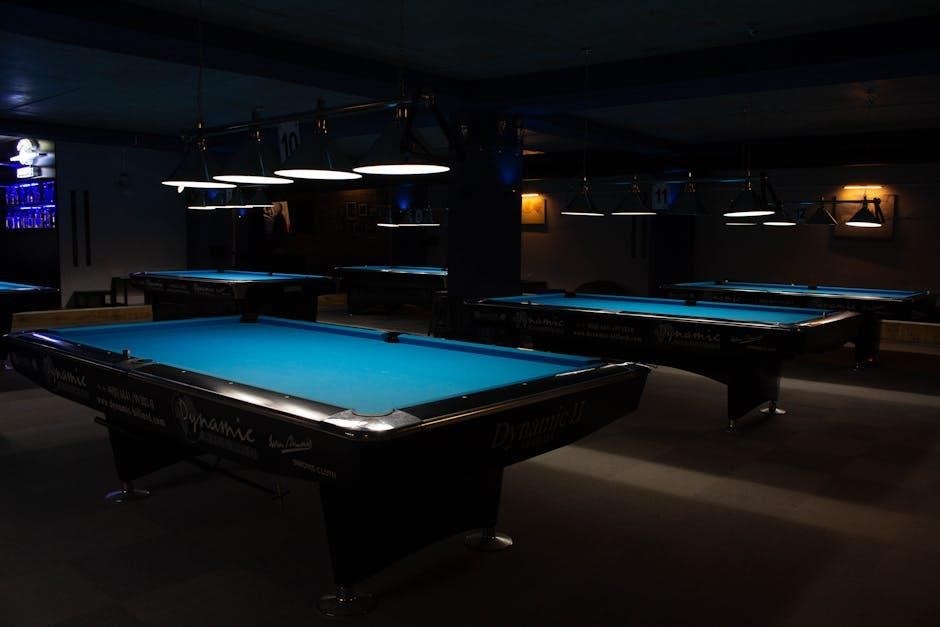
Space Requirements for Pool Tables
Measure your room carefully, considering the table size and additional clearance for cues and movement. Ensure at least 12ft by 15ft of space for a standard 9ft table.
Measuring Your Room for a Pool Table
Accurate measurements are essential to ensure your pool table fits perfectly. Measure the room’s length, width, and any obstructions like doorways or windows. Consider the table’s dimensions and add clearance for cue sticks (58-61 inches) on all sides. Ensure at least 36 inches of space around the table for comfortable play. If the room has an irregular shape, measure multiple points to confirm placement. Don’t forget to check ceiling height and doorframes for moving the table inside. Proper planning avoids installation issues and guarantees enjoyable gameplay.
Clearance and Playing Area Needs
Proper clearance is vital for a comfortable playing experience. Ensure at least 58-61 inches of space on all sides of the table to accommodate cue sticks. The playing area should be free from obstructions like furniture or walls. Aim for 36-48 inches of clearance around the table for unrestricted movement. Consider the room’s shape and any obstacles when planning the layout. Adequate space ensures smooth gameplay and prevents accidents. Measure carefully to balance the table size with the room’s dimensions for an optimal setup.
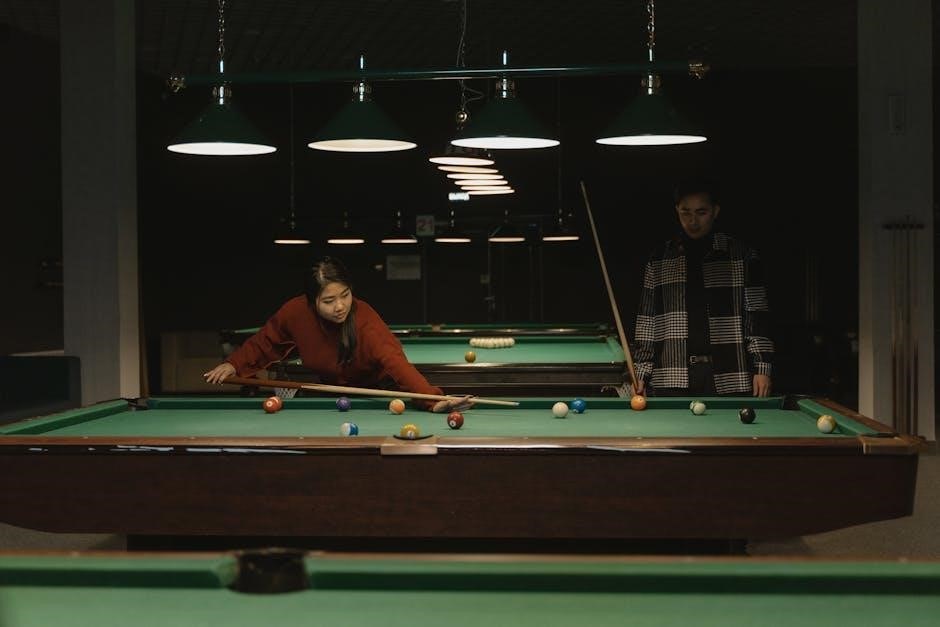
Factors Influencing Pool Table Size
- Budget: Larger tables are more expensive, impacting your purchase decision.
- Frequency of Use: Heavy use demands durable, standard sizes.
- Skill Level: Professionals prefer larger tables for challenging play.
- Space Constraints: Room size dictates the table size.
Budget Considerations
Your budget plays a significant role in determining the size and quality of your pool table. Larger tables made from premium materials are more expensive, while smaller, entry-level tables are more affordable.
- Set a budget range to narrow down options.
- Consider long-term durability and maintenance costs.
- Accessorize wisely to stay within budget.
Balance size, material quality, and brand reputation to find the best value for your money.
Frequency of Use
The frequency of use is a key factor in choosing a pool table size. If the table will be used often, especially in high-traffic settings, a larger, more durable table is recommended.
- Heavy use requires a sturdy table with high-quality materials.
- Occasional use allows for smaller tables or more affordable options.
- Consider how many players will use the table regularly.
Frequent play demands a table that can withstand wear and tear, while less frequent use may prioritize space-saving designs.
Skill Level and Player Preference
Skill level significantly influences pool table size selection. Professional players often prefer larger tables for precise shots and competitive play, while casual players may find smaller tables more manageable.
- Professionals typically opt for 9-foot tables for tournament standards.
- Intermediate players balance skill development with space constraints.
- Beginners benefit from smaller tables for easier control.
Player preference also plays a role, as some prioritize speed and accuracy, while others value recreational enjoyment. Aligning table size with skill level ensures satisfaction and enhances gameplay experience.
Choosing the Right Size for Your Needs
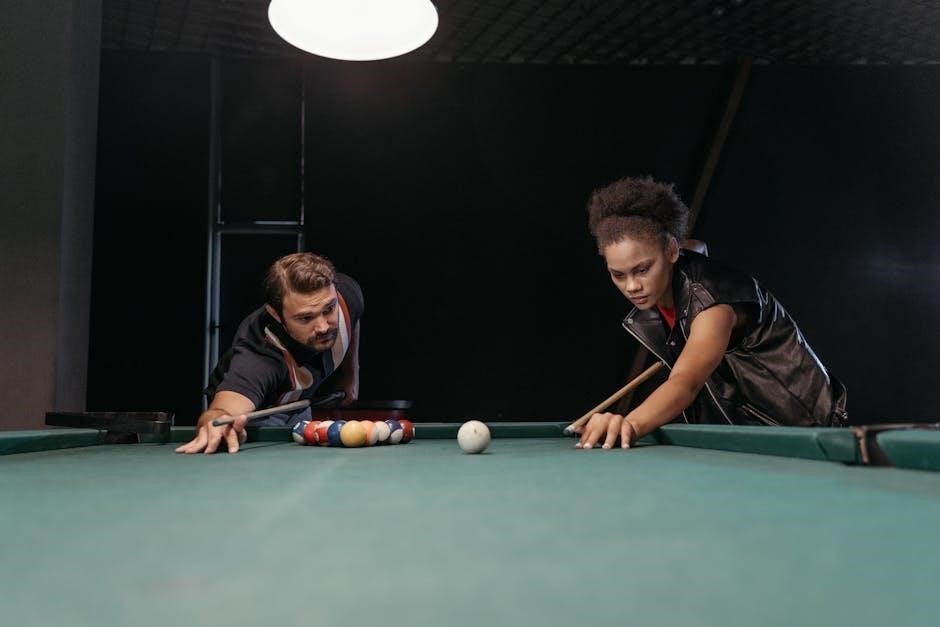
Choosing the right pool table size involves balancing room dimensions, skill level, and usage frequency to ensure optimal gameplay and spatial harmony for all players.
Pool Table Size for Recreational Players
For recreational players, a smaller pool table size, such as 7-foot or 8-foot, is ideal. These sizes are compact, cost-effective, and suitable for casual play. They offer ample space for enjoyable gameplay without requiring large rooms. A 7-foot table is perfect for smaller areas, while an 8-foot table provides a slightly larger playing surface for better accuracy. Both sizes cater to beginners and occasional players, ensuring fun and accessibility. Choosing the right size for recreational use ensures the table fits seamlessly into your home and meets your entertainment needs without compromising on gameplay quality or space efficiency.
Pool Table Size for Intermediate Players
Intermediate players benefit from a 9-foot or 8-foot pool table, offering a balance between space and skill development. A 9-foot table provides ample room for precise shots and advanced techniques, while an 8-foot table is slightly more compact yet still large enough for improving accuracy. These sizes are ideal for players seeking to refine their skills without needing professional-level space. They strike a perfect balance between recreational and competitive play, making them a popular choice for both home enthusiasts and smaller commercial settings. This size range ensures a challenging yet enjoyable experience for intermediate players.
Professional players typically require the largest pool tables, measuring 9 feet in length. This size offers ample space for complex shots and high-precision gameplay. The larger surface area allows for better control and accuracy, making it ideal for competitive environments. A 9-foot table is the standard in professional tournaments and is recommended for serious players aiming to master advanced techniques. It provides the ultimate challenge and prepares players for high-stakes competitions. Regular maintenance and proper setup are crucial to ensure optimal performance on such a table.
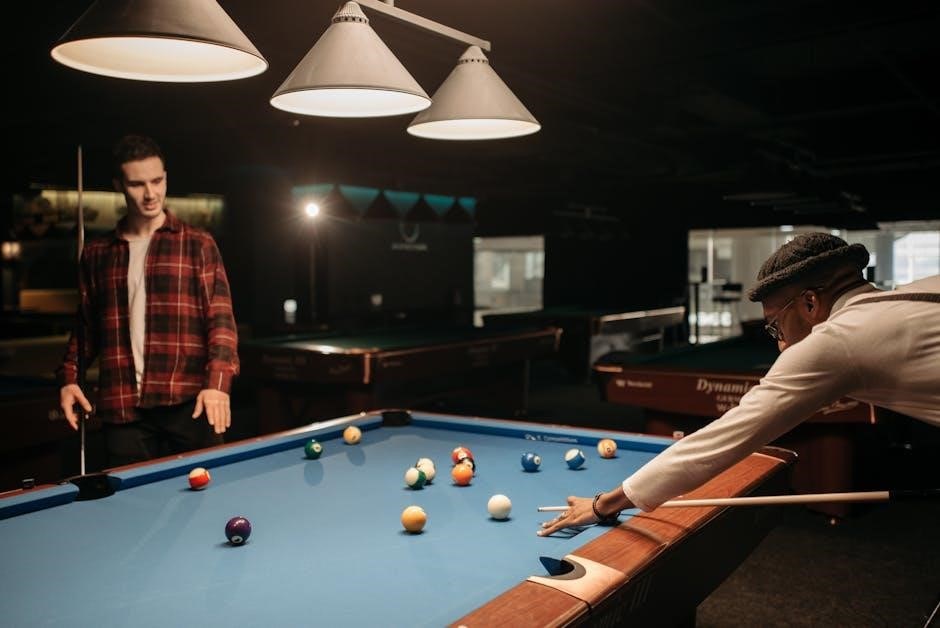
Maintenance and Upkeep
Pool Table Size for Professional Players
Professional players demand precision and control, making 9-foot pool tables the standard choice. These larger tables provide ample space for intricate shots and high-speed gameplay, ensuring accuracy and skill mastery. Regular maintenance, including cloth cleaning and leveling, is essential to uphold performance. Professionals also benefit from customizations like tighter pockets and smoother surfaces, enhancing competition readiness. Investing in a high-quality, tournament-grade table is crucial for serious players aiming to refine their techniques and compete at the highest levels.
Importance of Proper Table Maintenance
Proper pool table maintenance ensures longevity and optimal performance. Regular cleaning prevents dust and dirt buildup, which can damage the cloth and affect play quality. Inspecting and tightening bolts, as well as leveling the table, guarantees even gameplay. Neglecting maintenance can lead to warping or uneven surfaces, compromising accuracy. Additionally, maintaining the felt and cushions prevents wear and tear, preserving the table’s aesthetic and functionality. Routine care extends the lifespan of your investment and ensures years of enjoyable play. Always use recommended cleaning products to avoid damaging materials, keeping your table in prime condition for consistent performance.
Cleaning and Care Tips
Regular cleaning and care are essential to maintain your pool table’s condition. Use a soft brush to remove dust and debris from the felt surface daily. Avoid harsh chemicals or abrasive cleaners, as they can damage the cloth. For spills, blot gently with a clean, damp cloth. Use a table cover to protect against dust when not in use. Check and tighten bolts periodically to ensure stability. Clean the balls and cues regularly to prevent dirt buildup. For deep stains, consult a professional. Proper care extends the table’s lifespan and ensures smooth gameplay. Always follow manufacturer guidelines for cleaning products.
Choosing the right pool table size ensures optimal gameplay and enjoyment. Consider space, budget, and skill level to make an informed decision. Proper care enhances longevity and performance.
Final Thoughts on Selecting the Perfect Pool Table Size
Choosing the perfect pool table size requires balancing space, budget, and skill level. Measure your room carefully, ensuring enough clearance for comfortable play. For recreational use, a smaller table suffices, while professionals prefer larger sizes. Consider the table’s material and quality to ensure durability. Regular maintenance, like cleaning and leveling, extends its lifespan. By weighing these factors, you can select a table that enhances your enjoyment and meets your needs for years to come.
Key Takeaways for Buyers
When selecting a pool table, prioritize space measurement and budget alignment. Choose a size that fits your room and skill level, ensuring adequate clearance for smooth gameplay. Consider frequency of use to determine durability needs. Opt for high-quality materials to ensure longevity. Regular maintenance is essential for performance and appearance; By aligning these factors, you can find a pool table that enhances enjoyment and meets your specific requirements, providing lasting value for your investment and ensuring years of satisfying play.
